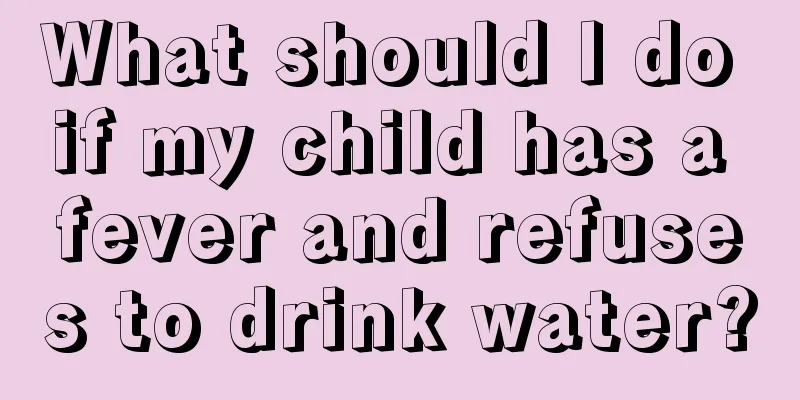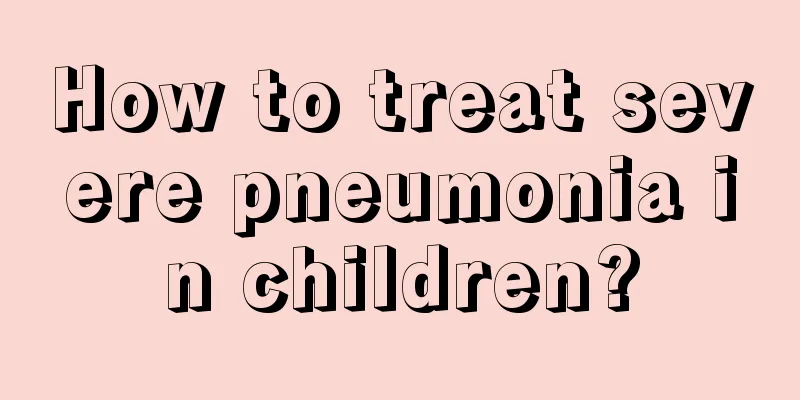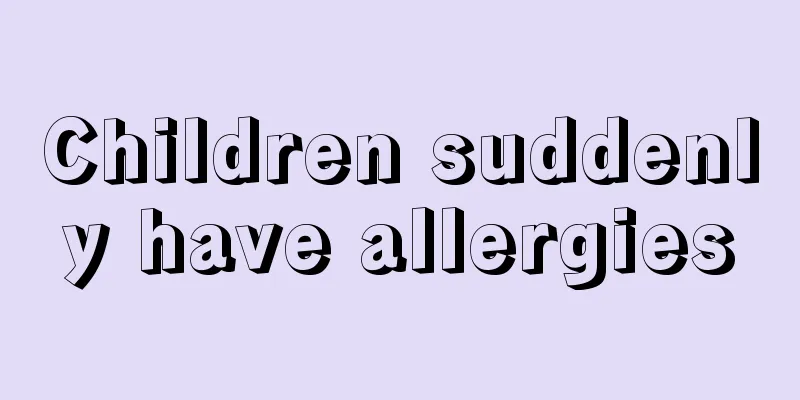What should I do if my child has a fever and refuses to drink water?

|
Once a child feels unwell or has a fever, parents will become very worried. Children are generally prone to fever between the ages of one to three. For example, children are prone to fever when they are teething, and they are more likely to have a fever if they catch a cold. If you go to the hospital, the doctor will prescribe a lot of antipyretics and the like, and then tell the parents to let the child drink more water. But what if the child has a fever and refuses to drink water? What to do if your baby has a fever and refuses to drink water: Add apple slices Your baby must drink plenty of water when he has a fever. Drinking water can increase urination and speed up the heat dissipation of the skin. And the most critical sign of a baby's fever coming down is sweating. Sweating can help cool the body down, and the main source of sweat is water, so be sure to replenish your baby with water during a fever. Generally, it is easier to get older babies to drink water, but babies under one year old are more resistant to drinking boiled water. At this time, mothers need to use their brains and think of ways. You can boil apple water and then let it cool down and give it to the baby to drink. The boiled apple water is sweet and sour, which is more in line with the preferences of babies. What to do if your baby has a fever and refuses to drink water: Increase the frequency of feeding Breastfed babies or formula-fed babies can appropriately increase the number of times they drink milk. Because 70% of formula or breast milk is water, this can also increase the body's water content. What to do if your baby has a fever and refuses to drink water: Try using a different water cup. If the same cup is used for a long time, the baby will lose interest in it, so give him another container. Babies like to drink from adult cups. If they don’t like to drink from their own cups, you can give them water from an adult cup. What to do if your baby has a fever and doesn't drink water: dilute the milk powder When a child has a high fever, the body's digestion and absorption functions are relatively weakened, the secretion of digestive enzymes is reduced, and the activity is relatively reduced. In addition, the high temperature in the body can easily denature proteins, making them difficult to digest and absorb. Therefore, when the fever is high, children can reduce their protein intake appropriately and drink more water. Dilute the milk or milk powder appropriately. This method can be used for children who are unwilling to drink water. Note: After the child's fever subsides, the milk powder should be prepared according to the original proportion. If diluted milk or milk powder is given to the child for a long time, the child will become malnourished in a short time. What to do if your baby has a fever and refuses to drink water: Be patient and try If he is thirsty, you can use a spoon to drop a little warm water on his tongue to let him feel the cool and comfortable feeling of water. Feeling comfortable, he will naturally want to feel more comfortable, and then he will want to drink water. This way you can feed him with the bottle. In order to make the baby interested in drinking water when he is not too thirsty, you can play some games or use colors to attract him. For example, you can reward him with a sip of water and dip it in some candy, or attract him with a cup or bottle with his favorite animal pattern or shape. Generally there is some effect. Be careful not to make the game too intense or exciting to avoid choking. |
<<: What's going on when a child is breathing heavily?
>>: Why do children always cry in the middle of the night?
Recommend
What to do if your one-year-old baby is short
Many parents always feel that their one-year-old ...
Methods of memory training for junior high school students
The majority of young people who are in junior hi...
What medicine should children take if they have lung heat and cough?
It is normal for children to have coughs, but if ...
What should I do if my child vomits after taking medicine when he has a fever?
Cold and fever are common symptoms in children, a...
Baby has phlegm anti-inflammatory Chinese patent medicine
If a baby has symptoms such as a cold or cough, i...
How to treat a three-year-old child with nasal congestion
Babies around three years old are very cute and c...
Is it a big deal if a child has lymph nodes?
Lymph nodes are an important organ in our human b...
Dry skin on two month old baby
Babies around two months old are in a critical pe...
Treatment of sudden fever in young children
Many of us are particularly susceptible to catchi...
What are the effects of pediatric undescended testicle surgery?
The cryptorchid surgery for children is actually ...
What causes a baby's breathing to be loud?
When new mothers encounter their children's l...
How to treat children’s poor digestion?
Many people suffer from indigestion, stomach pain...
Eight taboos in parent-child games with children
I have an article titled "Parent-child games...
Why does the newborn's skin turn yellow?
Many newborns have particularly yellow skin after...
What to do if your 2-year-old baby has anorexia
Children's diet has always been a very headac...









